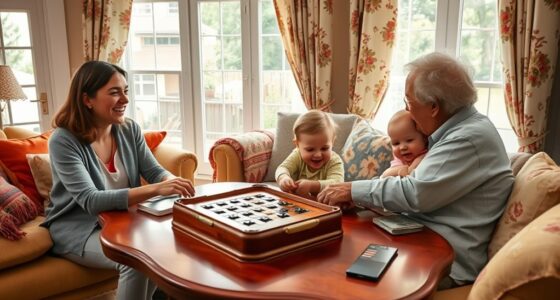Playing strategic and classic board games can boost your cognitive abilities by sharpening problem-solving, memory, and pattern recognition. Games like chess enhance visual-spatial skills and strategic thinking, while Scrabble builds vocabulary and recall. Settlers of Catan and Ticket to Ride promote planning and decision-making, and cooperative games improve social understanding. Engaging with a variety of these games continually challenges your brain, helping to maintain mental agility. Keep exploring to discover more ways these games can strengthen your mind.
Key Takeaways
- Strategic games like Chess and Go enhance problem-solving, visual-spatial skills, and cognitive flexibility.
- Word-based games such as Scrabble improve vocabulary, memory, and pattern recognition.
- Resource management games like Settlers of Catan develop planning, decision-making, and strategic thinking.
- Cooperative games foster social skills, emotional regulation, teamwork, and social cognition.
- Pattern recognition and brain-training games boost neural connections, mental agility, and overall cognitive health.
The Cognitive Benefits of Chess
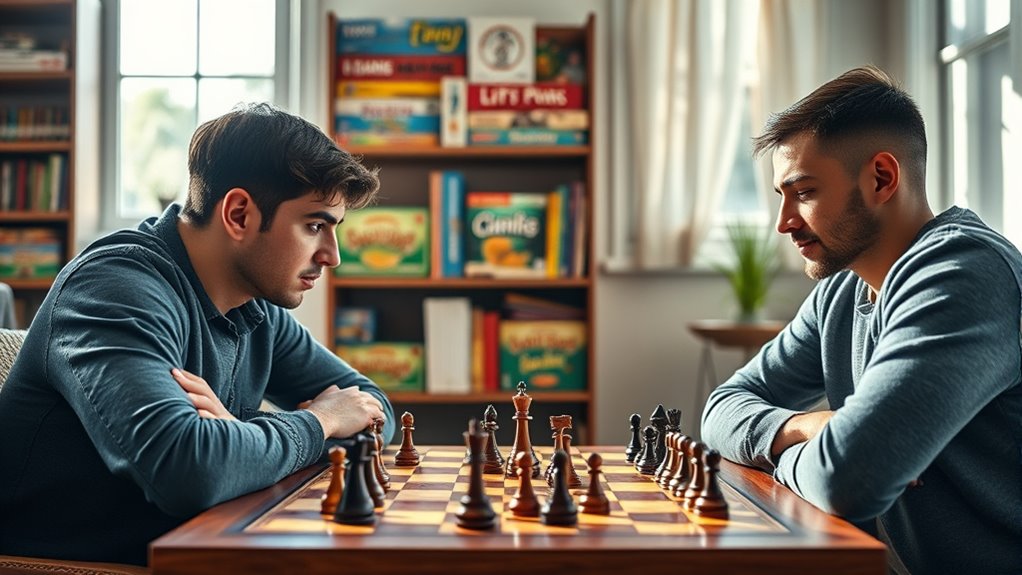
While many games can improve your mental skills, chess stands out as especially effective. Playing chess sharpens your visual-spatial skills, helping you better understand how pieces relate to each other on the board. It also enhances your problem-solving techniques by challenging you to anticipate your opponent’s moves and develop strategies in real-time. Each game requires you to analyze complex positions, think ahead, and adapt quickly, strengthening your cognitive flexibility. As you plan multiple moves ahead, your ability to visualize different scenarios improves. Chess encourages strategic thinking and patience, making it a powerful tool for boosting mental acuity. With consistent play, you’ll notice improvements in your analytical thinking and mental clarity, benefiting other areas of your life. Additionally, integrating AI-powered training tools can further optimize your learning and skill development.
How Scrabble Enhances Vocabulary and Memory

Playing Scrabble helps you build your vocabulary by challenging you to find new words and expand your language skills. As you memorize word patterns and spellings, your memory gets reinforced with each game. This combination makes Scrabble a powerful tool for boosting both your word-building skills and recall ability.
Word Building Skills
Scrabble is a powerful tool for enhancing your vocabulary and memory by encouraging you to think creatively about word formation. As you play, you develop word association skills that help connect related words, boosting your vocabulary expansion. The game challenges you to identify high-scoring words using limited tiles, improving your ability to recognize patterns and build on existing knowledge. Here’s a visual to inspire you:
| Letter | Word Idea | Related Word |
|---|---|---|
| C | Cat | Animal |
| A | Apple | Fruit |
| R | Race | Competition |
| T | Tree | Nature |
| S | Sun | Weather |
This process sharpens your word-building skills, making you more confident with language. Additionally, understanding French Press Operation can help you appreciate the importance of technique and precision, which can also be applied to strategic thinking in games like Scrabble.
Memory Reinforcement
Engaging in Scrabble regularly strengthens your vocabulary and memory by requiring you to recall and apply a wide range of words. This mental challenge promotes neuroplasticity exercises that enhance your brain’s adaptability. As you strategize and remember spellings, you reinforce neural pathways associated with language and memory. Playing consistently can also help in cognitive decline prevention, especially as you age. The process encourages your brain to form new connections, improving overall cognitive resilience. Scrabble pushes you to remember unfamiliar words and their meanings, which sharpens your recall skills over time. This ongoing mental workout not only boosts your vocabulary but also fortifies your memory, making it a valuable tool for lifelong cognitive health. Additionally, integrating mindful decluttering strategies can create a more organized environment that supports mental clarity and focus, further enhancing your ability to learn and remember new information.
The Strategic Depth of Settlers of Catan
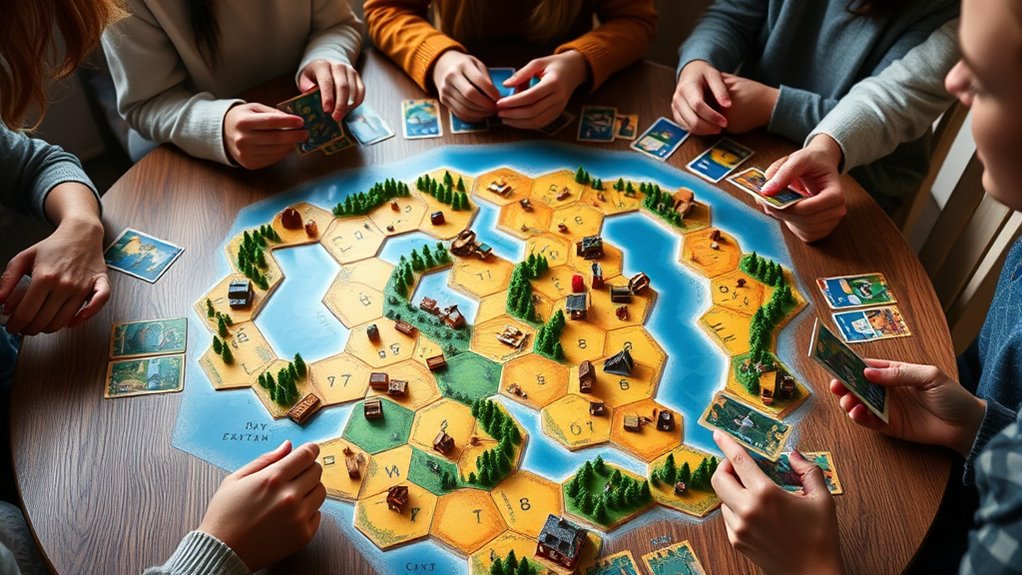
Because of its intricate resource management and tactical decision-making, Settlers of Catan offers a rich strategic experience that challenges you to think ahead and adapt quickly. You must balance resource acquisition with trading and construction, making every decision impactful. The game emphasizes economic strategy, as you aim to optimize resource use to expand your settlements efficiently. Each turn requires evaluating the current board state, predicting opponents’ moves, and adjusting your plan accordingly. This depth encourages you to develop long-term strategies while remaining flexible to new opportunities. The interplay between resource management and strategic placement keeps the game engaging, sharpening your ability to plan, negotiate, and adapt—skills that significantly boost your cognitive flexibility and problem-solving capabilities. Additionally, the game’s reliance on predicting opponents’ moves fosters strategic thinking and anticipatory skills that are crucial for cognitive development.
Brain-Boosting Challenges in Ticket to Ride
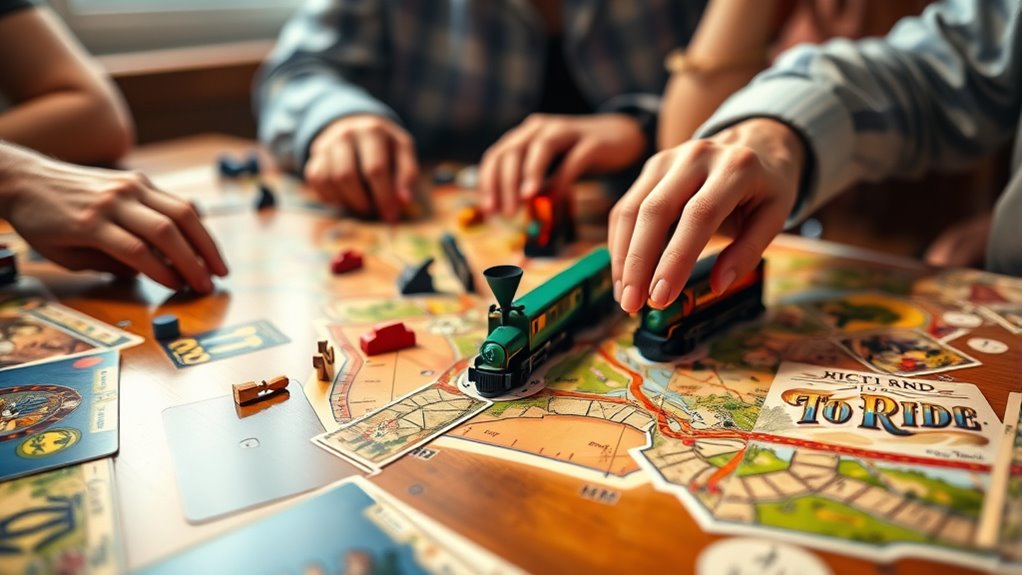
Ticket to Ride challenges you to think strategically about route planning and resource management, building on skills from Settlers of Catan. You must analyze geographic strategies to connect distant cities efficiently while blocking opponents. The game’s auction mechanics add a layer of skill, requiring you to bid wisely for critical train cards and routes. Balancing your hand, timing your claims, and anticipating competitors’ moves sharpen your decision-making and tactical thinking. As you navigate the map, you develop spatial awareness and flexibility in adapting plans. These brain-boosting challenges push you to optimize routes and resources under pressure, enhancing cognitive functions like planning, foresight, and strategic flexibility. Additionally, playing such games can influence family dynamics and relationships, fostering social interaction and teamwork. Ticket to Ride’s blend of geographic insight and auction mechanics makes it a powerful tool for mental exercise.
Memory and Pattern Recognition With Memory Games

Playing memory games can sharpen your ability to recall information quickly and accurately. These games also improve your pattern recognition skills, helping you spot connections more easily. By practicing regularly, you’ll strengthen your memory enhancement strategies and boost your overall cognitive function. Additionally, engaging in strategic problem-solving activities during gameplay can further enhance your mental agility.
Memory Enhancement Strategies
Engaging in memory games and pattern recognition exercises can substantially enhance your cognitive skills. To boost memory, try mnemonic techniques like visualization or acronyms to make recall easier. Incorporate recall exercises into your routine, such as trying to remember sequences or details after a delay. These strategies strengthen your ability to store and retrieve information effectively. You can also:
- Use mnemonic devices to link new information to familiar concepts
- Practice recall exercises regularly to reinforce memory pathways
- Challenge yourself with memory games that require recalling patterns or sequences
- Recognize that mental potential can be mobilized through targeted activities, leading to more profound cognitive enhancement.
Pattern Recognition Skills
Pattern recognition skills are essential for analyzing and making sense of complex information, and memory games can considerably enhance these abilities. By practicing visual pattern recognition, you improve your ability to quickly identify and interpret patterns in images, symbols, or arrangements. Many memory games challenge you to remember sequences, which sharpens your sequence identification skills. For example, games like Simon require you to recall and replicate color sequences, strengthening your capacity to recognize and predict patterns. This not only trains your visual and auditory senses but also boosts your overall cognitive flexibility. As you become more adept at spotting and remembering patterns, you enhance your ability to process information efficiently, which benefits problem-solving, decision-making, and learning across various contexts. Additionally, understanding the importance of contrast ratio in visual clarity can help you better evaluate the quality of images and displays, further supporting your pattern recognition development.
Puzzle Solving and Critical Thinking in Carcassonne
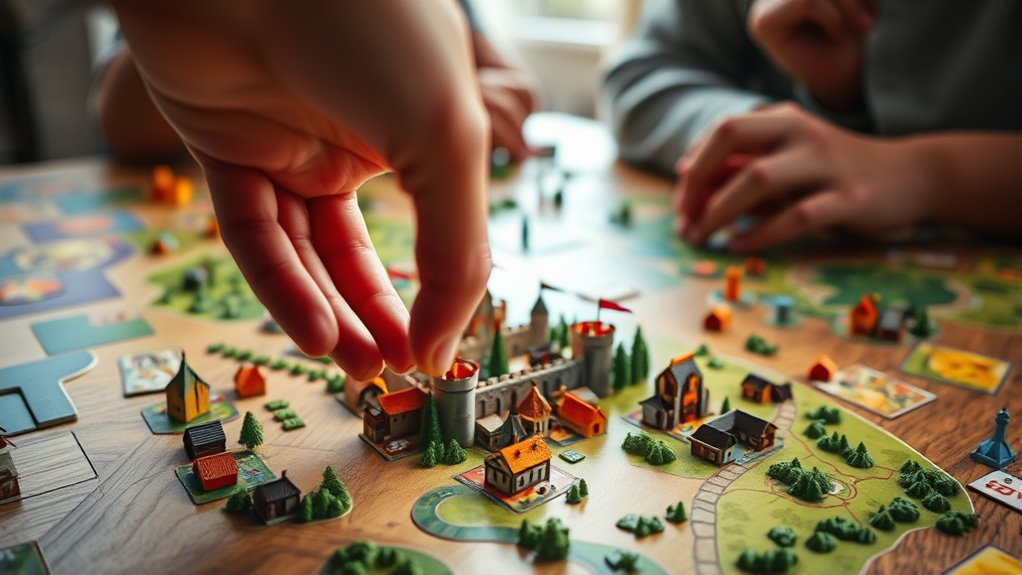
Have you ever wondered how Carcassonne sharpens your puzzle-solving skills and enhances critical thinking? This game challenges you to use geographic reasoning and spatial visualization to craft the best city, road, or farm. As you plan your moves, you’ll analyze the layout and anticipate opponents’ strategies. Incorporating elements of automation technology can also streamline gameplay analysis and strategy development.
Key skills developed include:
- Geographic reasoning: understanding how tiles connect across the board
- Spatial visualization: visualizing how new tiles fit into existing structures
- Strategic problem-solving: adapting your plans based on changing configurations
Playing regularly improves your ability to process spatial relationships quickly and make informed decisions. Carcassonne isn’t just fun—it’s a mental workout that sharpens your puzzle-solving and critical thinking abilities through engaging tile placement.
The Role of Cooperative Games in Social Cognition
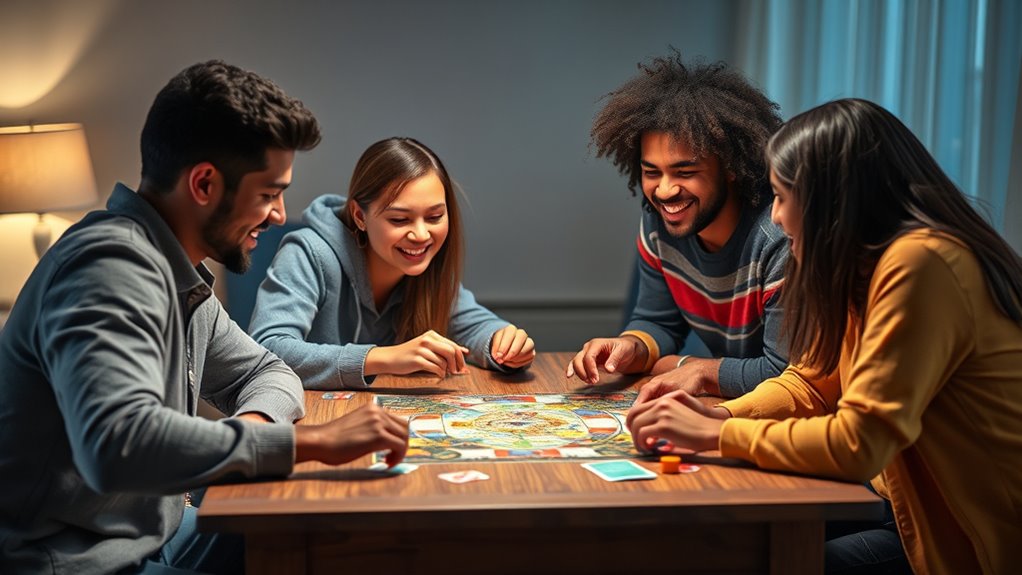
While competitive games sharpen individual thinking, cooperative games emphasize working together to solve problems and achieve common goals. These games foster team strategy, requiring players to coordinate actions and share ideas clearly. As you collaborate, your social awareness improves—you become more attuned to others’ emotions, cues, and perspectives. This heightened understanding helps build trust and empathy, essential skills for effective teamwork. Cooperative games challenge you to listen actively, communicate effectively, and adapt strategies based on group input. By focusing on collective success rather than individual victory, you develop a deeper appreciation for group dynamics. This environment encourages open dialogue and mutual support, which enhances social cognition and strengthens your ability to navigate social situations beyond the game. Additionally, research supports that such personality traits are key indicators of interpersonal effectiveness and group harmony.
Card Games That Improve Focus and Decision-Making
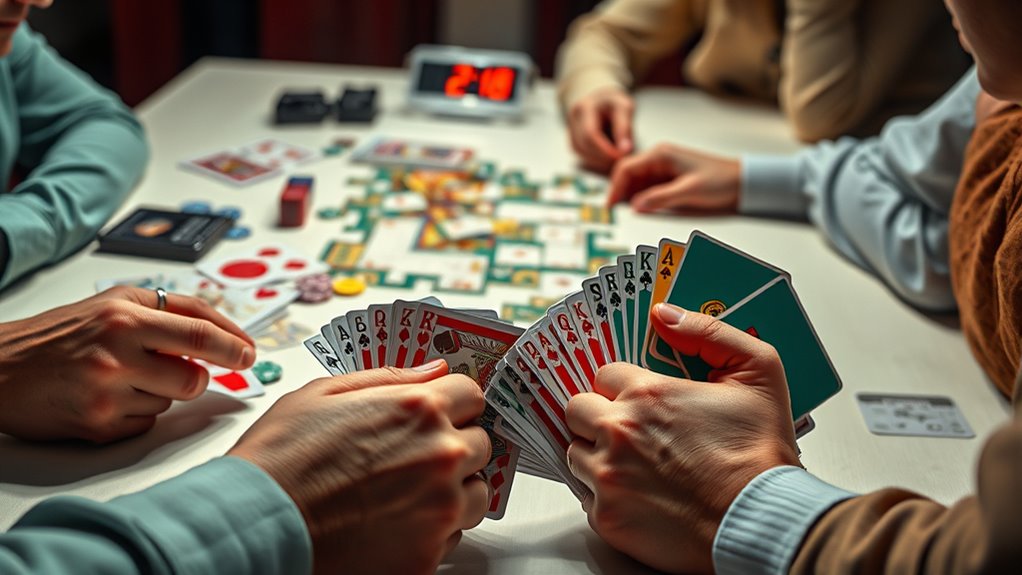
Card games are an excellent way to sharpen your focus and enhance decision-making skills, especially because they require sustained attention and quick thinking. As you play, you naturally develop focus strategies that help you stay alert and make better choices. To improve your skills further, try incorporating memory techniques like associating cards with images or patterns, which can boost recall during game play. Additionally, analyzing opponents’ moves encourages strategic thinking. Consider these focus strategies:
- Practicing visualization to remember card sequences
- Setting short-term goals for each turn
- Staying present to avoid distractions
Brain Training With Brain-Teasing Board Games

Building on the focus and strategic skills developed through card games, engaging with brain-teasing board games offers a powerful way to challenge your mental agility. These games specifically enhance your visual-spatial skills, requiring you to analyze patterns, plan moves, and anticipate outcomes. As you navigate complex puzzles and layered strategies, you also sharpen your emotional regulation, learning to stay calm and focused under pressure. Brain-teasing board games encourage you to think critically and adapt quickly, strengthening neural connections that support problem-solving. They push your cognitive boundaries while making the experience enjoyable. By regularly playing these games, you actively train your brain to become more agile, resilient, and better equipped to handle everyday mental challenges.
The Science Behind Brain-Engaging Classic Games
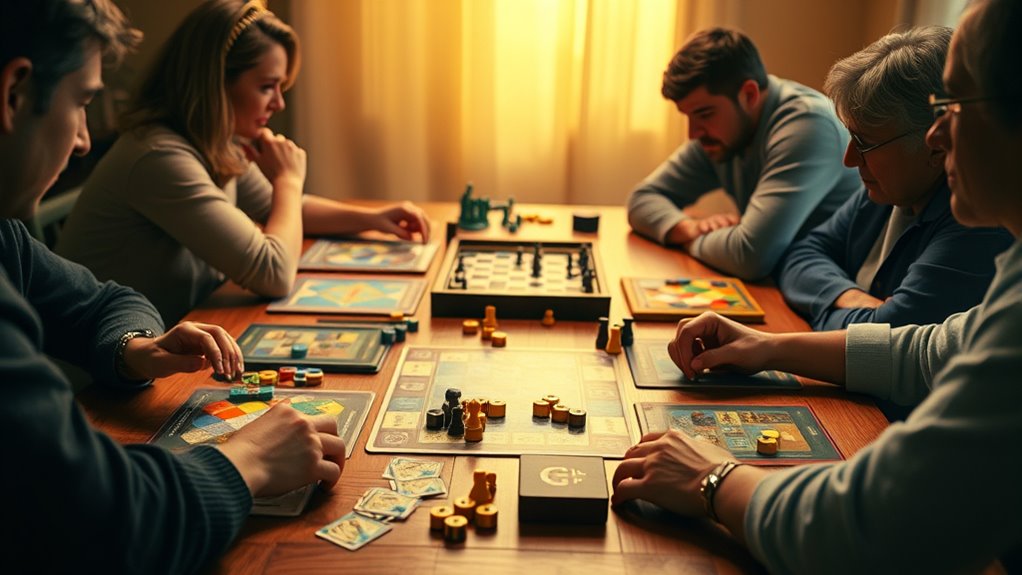
Classic games like chess, Scrabble, and Go have long been celebrated not only for their entertainment value but also for their proven ability to stimulate the brain. These games enhance neuroplasticity benefits by challenging your brain to form new neural connections, improving overall cognitive flexibility. They also support attention span development as you focus on complex strategies and anticipate opponents’ moves.
Classic games boost brain plasticity and attention through strategic play and problem-solving.
The science behind this includes:
- Increased mental agility through strategic thinking
- Strengthened neural pathways via repetitive problem-solving
- Improved concentration and sustained attention during gameplay
Engaging with these classic games exercises your brain in ways that promote long-term cognitive health, making them valuable tools for boosting mental sharpness and resilience over time.
Frequently Asked Questions
Which Age Groups Benefit Most From Playing Cognitive Board Games?
You’ll find that different age groups gain unique benefits from playing cognitive board games, thanks to age-specific benefits aligned with developmental stages. Children improve their problem-solving and memory skills, while adults sharpen strategic thinking and mental agility. seniors, on the other hand, can boost their cognitive resilience and delay cognitive decline. No matter your age, engaging in these games encourages mental exercise, keeping your brain active and healthy through all stages of life.
Are There Any Risks Associated With Excessive Board Game Play?
You might think more game time always means more fun, but beware—excessive play risks game addiction and social isolation. While you chase that winning streak, you could be missing out on real-world connections. Ironically, what’s meant to bring people together might push you further apart. Playing in moderation keeps your mind sharp without sacrificing your social life. Balance is key to truly enjoying the benefits of gaming.
How Do Cooperative Games Compare to Competitive Games for Brain Health?
Cooperative games often promote team collaboration and strategic thinking, which can be more beneficial for brain health than competitive games. When you work together, you challenge your problem-solving skills and foster communication, strengthening your cognitive abilities. In contrast, competitive games may stimulate quick decision-making but can increase stress. Playing cooperative games regularly helps build mental resilience, improves social connections, and keeps your brain engaged in meaningful ways.
Can Playing These Games Help Prevent Cognitive Decline?
Playing engaging games can help prevent cognitive decline by stimulating brain plasticity and maintaining mental agility. When you challenge yourself with strategic or cooperative games, you actively promote neural connections, which keeps your mind sharp. Regularly engaging in such activities encourages your brain to adapt and grow, reducing the risk of decline over time. So, yes, consistent game playing can be a valuable part of your mental health routine.
What Are Some Beginner-Friendly Board Games for Cognitive Enhancement?
Think of your mind as a muscle that needs regular workouts. For beginners, try games like Ticket to Ride or Catan, which offer simple strategy training and memory exercises. These games are easy to learn yet engaging enough to challenge your brain. They help improve your strategic thinking and memory skills without feeling overwhelming. Start here, and you’ll be strengthening your cognitive muscles step by step.
Conclusion
So, next time you’re stuck on a boring weekend, why not grab a board game and pretend you’re exercising your brain? Who knew that risking your farm in Catan or forming words in Scrabble could actually make you smarter? Forget about fancy gadgets—just roll the dice and watch your cognitive skills level up. After all, nothing screams “brain boost” like a little friendly competition and a good excuse to avoid doing chores.





